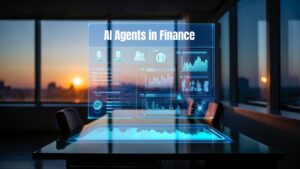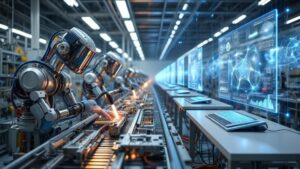As technology continues to reshape human experiences and interactions, the convergence of artificial intelligence (AI) and politics has become a vital area of exploration. From automating routine tasks to supporting decision-making processes, AI is steadily integrating into various aspects of governance and political systems worldwide. The future of politics in the age of AI is not merely about adopting advanced technologies but also about comprehending their impact on democratic principles, openness, and public confidence. As AI becomes more widespread, it promises to alter governance, political campaigns, and even the core nature of electoral processes.
AI in politics is already a reality; from data analysis and voter targeting to gauging public sentiment and monitoring social media, the technology fundamentally changes how political campaigns are conducted. However, this change brings both possibilities and challenges. On one side, AI presents new methods to enhance decision-making, improve governance, and streamline political processes.
On the other side, there are concerns about ethical AI in politics, such as issues related to data privacy, misinformation, and potential biases in AI algorithms. This article explores the current state and the future of politics in the age of AI and examines AI’s implications for governance, elections, and democratic values.
The Growth of AI in Politics: An Overview
AI has significantly impacted various sectors, and politics is no exception. The use of AI in politics has advanced considerably over the past decade, progressing from simple data analysis to more sophisticated applications like AI-driven political decision-making and governance. Today, AI tools are used to analyze voter behavior, categorize audiences, and craft highly customized campaign messages.
For example, political campaigns and AI algorithms are a common occurrence now when it comes to analyzing large datasets, such as voter demographics and social media activity, to more effectively target voters and predict election outcomes with greater precision.
Political campaigns and AI are increasingly interconnected, with AI tools now being utilized for sentiment analysis and forecasting trends. Social media platforms like Facebook and Twitter use AI to manage content, while political campaigns use similar technologies to observe public sentiment and adapt their strategies accordingly. In recent elections, AI has played a major role in identifying key voter issues, predicting voter turnout, and even developing campaign messages that appeal to specific voter segments.
One notable example illustrating AI’s influence on elections is the 2016 U.S. Presidential election, where both major parties utilized AI tools for data collection, voter targeting, and digital marketing. The Cambridge Analytica controversy revealed how data analytics, powered by AI, could be employed to sway voter behavior by creating personalized messages based on psychological profiles. This raised significant concerns about the ethical AI in politics and the potential risks of AI-driven misinformation campaigns.
AI and Political Decision-Making: The New Governance Framework
The incorporation of AI into governance introduces a new model for political decision-making, where AI systems assist policymakers by providing data-informed insights and recommendations. AI in governance can be applied to enhance efficiency, reduce bureaucratic delays, and ensure more informed decision-making. For instance, AI-driven tools can analyze vast amounts of data to uncover patterns and trends that may not be immediately apparent to human analysts, enabling governments to formulate better policies.
AI applications in policy formulation can include data-based policy analysis, predictive modeling for social issues, and real-time monitoring of policy outcomes. By employing AI, governments can simulate various policy scenarios, evaluate their potential impacts, and make necessary adjustments quickly. Additionally, AI can help detect corruption by analyzing financial transactions and government records for irregularities, promoting greater openness in governance.
However, the potential benefits of AI in political decision-making come with risks. There is a danger of over-reliance on AI, which could compromise democratic values by centralizing decision-making in automated systems rather than human representatives. AI’s impact on democracy could also be harmful if it leads to the erosion of public trust or reinforces existing biases through opaque algorithms. Finding a balance between using AI for improved governance and maintaining democratic oversight is vital for the future of governance with AI.
AI and Electoral Processes: Prospects and Challenges
The relationship between artificial intelligence and elections is growing, with AI technologies presenting opportunities and risks for electoral processes. On the one hand, AI can improve electoral processes by predicting voter behavior, optimizing campaign strategies, and even monitoring election procedures for irregularities. AI-driven systems can analyze voter data to identify trends, such as changes in public opinion or emerging political movements, helping political parties adjust their strategies accordingly.
AI can also play a role in ensuring fairer elections. For example, AI tools can monitor social media platforms for signs of misinformation, detect instances of electoral fraud, and provide real-time updates on voting patterns. These capabilities can help enhance transparency and integrity in electoral processes, making them more robust and resistant to manipulation.
However, the relationship between artificial intelligence and elections also raises ethical concerns. Issues such as voter manipulation, data privacy violations, and spreading misinformation are significant challenges. AI-driven algorithms can be used to micro-target voters with custom messages, potentially influencing their perceptions and decisions. Moreover, AI can amplify fake news and misinformation, posing a threat to the integrity of democratic processes. To mitigate these risks, it is important to establish robust regulatory frameworks that ensure the ethical standards for artificial intelligence and elections.
The Role of AI in Political Campaigns
Political campaigns and AI are becoming increasingly interconnected, with AI tools being used to enhance the effectiveness of campaign strategies. Political parties use AI to target voters more accurately, segment audiences based on demographics and behaviors, and personalize campaign messages to resonate with specific voter groups. AI-powered tools for social media monitoring and sentiment analysis allow campaigns to gauge public opinion in real time and adjust their strategies accordingly.
AI is also playing a growing role in generating campaign content. From creating personalized emails and social media posts to developing video content designed for specific audiences, AI-generated content is becoming a staple of modern political marketing. This approach enables campaigns to reach more voters with customized messages at a lower cost, increasing their overall effectiveness.
However, the rise of AI-generated content in political campaigns also brings challenges, particularly concerning misinformation and deep fakes. AI technologies can be used to create realistic but false images, videos, or audio recordings that can mislead voters and undermine trust in political processes. As such, it is significant to address these concerns by implementing ethical guidelines for AI use in political campaigns.
Policy-Making, AI, and Governance: A Paradigm Shift
The fusion of AI and policy-making marks a substantial change in governance approaches. By utilizing advanced data analytics and machine learning, AI can help shape future policies with a degree of accuracy and flexibility that was previously out of reach. AI’s influence on policy-making is evident in various domains, such as labor, healthcare, and security, where data-informed insights can enable more informed and timely decisions.
AI’s Role in Influencing Policies
AI and governance are becoming increasingly interconnected, with governments adopting AI technologies to analyze extensive datasets and identify patterns that inform policy creation. For example, AI can uncover social and economic trends, forecast the outcomes of different policy interventions, and model future scenarios. These capabilities help governments craft policies that are more adaptable to the changing needs of their populations.
Real-Time Policy Modifications and AI
One of the most impactful use cases of AI and policy-making is its potential for immediate adjustments. With AI’s continuous data analysis capabilities, governments can modify policies based on new information and changing circumstances.
For instance, during public health emergencies, AI-driven models can monitor disease spread, evaluate the effectiveness of containment measures, and propose policy changes in real-time. This adaptability can greatly enhance the effectiveness of governmental responses to crises.
Influence on Different Policy Frameworks
Results of AI and policy-making span across various sectors:
- Labor Policies: AI can analyze labor market trends to predict skill shortages and suggest targeted interventions, like reskilling programs, to reduce unemployment.
- Healthcare Policies: AI-based insights can assist in designing better healthcare policies by forecasting disease outbreaks, identifying gaps in service delivery, and optimizing resource distribution.
- Security Policies: In national security, AI tools can detect and predict cyber threats, contributing to the development of more comprehensive cybersecurity policies.
However, while AI offers considerable advantages in policy-making, it also carries the risk of unintended consequences. AI-driven governance could exacerbate inequalities if the data-shaping policies are biased or incomplete. To prevent this, policymakers need to ensure that datasets are diverse and representative and that AI systems remain transparent and accountable.
Balancing AI-Enhanced Efficiency with Fairness
While AI has the potential to create data-focused policies that improve efficiency, there is a danger of widening inequalities if AI tools are not carefully managed. To counter these risks, finding a balance between using AI to enhance governance and ensuring that all citizens benefit fairly from its applications is necessary. This includes developing regulatory frameworks that promote ethical AI in politics and integrating diverse data sources to avoid biased outcomes.
Challenges and Ethical Considerations of AI in Politics
As AI becomes more integrated into political systems, it introduces numerous ethical challenges that must be addressed to maintain fair and democratic governance. A major concern is the risk of algorithmic bias, which occurs when AI systems make decisions based on biased or incomplete data. This can lead to unjust policy outcomes that reinforce existing social inequalities.
Algorithmic Bias and Responsibility
Algorithmic bias can lead to discriminatory practices in political decision-making, such as targeting specific groups for surveillance or profiling. To mitigate this, it is crucial to implement transparent algorithms that are regularly audited for bias and to establish mechanisms to hold AI applications in governance accountable.
Opacity in AI Decision-Making
Another critical issue is the lack of clarity in AI-driven decisions. When AI algorithms are used in governance, there may be uncertainty about how these decisions are made, leading to concerns about their legitimacy and fairness. That’s why AI and political transparency are critical when it comes to maintaining public trust and upholding democratic values.
Data Privacy and Monitoring Concerns
AI in politics often involves collecting and analyzing vast amounts of personal data, raising concerns about privacy and surveillance. Without proper oversight, AI could infringe on individuals’ rights, especially in authoritarian regimes where surveillance technologies might be used to suppress dissent.
Regulatory Frameworks for Ethical AI Use
To address these ethical challenges, there is an increasing need for regulatory frameworks that govern the use of AI in politics. These frameworks should emphasize transparency, fairness, and accountability, ensuring that AI applications align with democratic principles and protect citizens’ rights. Governments and international organizations must collaborate to establish standards and guidelines for the ethical use of AI in political contexts.
The Future of Democracy and AI: Predictions and Trends
Looking ahead, the fate of democracy and the future of politics in the age of AI will likely involve a complex interplay between technological progress and human-centered governance. While AI-driven governance models hold great promise for enhancing decision-making effectiveness, there are also significant risks that must be managed to safeguard democratic values.
AI-Governed Models and Digital Democracies
The future of governance with AI may include the rise of digital democracies, where citizens participate in decision-making processes through AI-facilitated platforms. These platforms could enable more direct forms of democracy by allowing citizens to vote on policy issues or provide immediate feedback on government actions. However, the success of such models will depend on ensuring that AI tools are transparent, unbiased, and accessible to all citizens.
Transformations in Electoral Systems and Political Participation
AI technologies could also reshape electoral systems by introducing innovations such as electronic voting and automated policy-making. AI-powered voting systems could make the voting process more accessible and secure, while AI-driven policy tools could offer governments real-time insights into public opinion and sentiment. These developments could potentially increase political engagement, particularly among younger and more tech-savvy citizens.
Future Projections for AI and Political Systems
AI will likely play a more significant role in shaping political systems in the coming years. However, the extent of its impact will depend on how governments and societies choose to use and regulate AI technologies.
AI could lead to more efficient, transparent, and responsive governance if managed effectively. Conversely, if left unchecked, it could undermine democratic values by concentrating power among a few and eroding public trust.
Balancing Technology with Human-Centered Governance
To maintain a balance between technological advancements and human-centered governance, it is vital to develop policies and frameworks that promote the responsible use of AI. This includes ensuring that AI tools enhance, rather than replace, human decision-making processes and that citizens retain a central role in democratic governance.
FAQs: Common Questions about the Future of Politics in the Age of AI
- How is AI currently used in politics?
AI is employed in politics for various purposes, such as analyzing voter behavior, targeting campaign messages, monitoring social media sentiment, and improving decision-making processes.
- Can AI make political decisions more effective?
Yes, AI-driven political decision-making can enhance efficiency by providing data-driven insights, predictive modeling, and real-time analysis to support policy-making and governance.
- What are the ethical concerns of using AI in governance?
Ethical concerns include algorithmic bias, lack of transparency, data privacy issues, and the potential misuse of AI for surveillance and manipulation.
- How does AI impact election integrity?
AI can positively affect election integrity by detecting and preventing fraud but also poses risks such as misinformation and voter manipulation through AI-generated content.
- Will AI replace politicians in the future?
AI is unlikely to replace politicians entirely but could assist decision-making by providing data-driven insights and recommendations.
- How can AI promote transparency in political processes?
AI can promote transparency by offering real-time data analysis, automating the monitoring of government activities, and enabling more open communication with citizens.
Further Reading
To explore the future of politics in the age of AI further, consider the following resources:
Books
- “Atlas of AI: Power, Politics, and the Planetary Costs of Artificial Intelligence” by Kate Crawford
- “The Ethical Algorithm: The Science of Socially Aware Algorithm Design” by Michael Kearns and Aaron Roth
- “AI Ethics: A Textbook” by Paula Boddington
Research Articles
- Whitepapers on AI’s role in electoral processes and governance.
- Articles examining the ethical implications of AI in political systems.
Reports
- Studies on the impact of AI-driven political decision-making and the future of governance with AI.
- By examining these resources, you can gain a deeper understanding of how AI is reshaping the political landscape as well as AI’s impact on democracy.
If you’re ready to take your business to the next level with AI-driven demand forecasting or any other advanced technology solutions, contact RTS Labs today for a free consultation. Our experts are here to help you leverage the power of AI to boost your business success.






